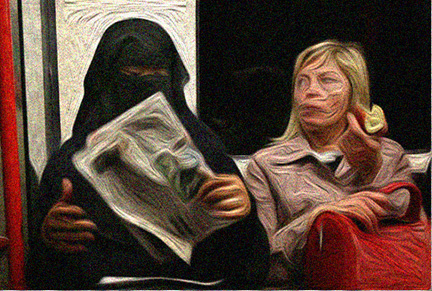
By Amanullah De Sondy, Sacred Matters
A recent Pew Research Center study indicated how “people†in various Muslim countries “prefer†Muslim women to dress. The results are varied from fully veiled dress to no veil at all. There seems to be no turning away from public interest in Muslim women and the flurry of commentaries from public intellectuals has begun. Beyond the polemics of discussions on Muslim women, I’m interested to interrogate the notion of “preference†in this matter and ask, “Who are these ‘people’?â€
Issues of women and veiling may seem simple at face value but in fact, they are complex and require interrogating a variety of themes and concerns in Islamic cultures and societies.
The way in which anyone covers his or her body is bound to considerations of gender, culture and politics. I guess in some way, no one is independent regarding what they can and cannot wear; we are still restricted on how we dress ourselves, which leads some individuals to attempt to impose clothing ideals on to others. I can’t help but think back to the images of the formally clothed, white colonial male anthropologist who sits beside the unclothed black woman’s body. Without a word being spoken, a thousand statements are made. Clothing and veiling equally play a central role in Muslim societies, where citizens return to concepts and constructions of what godly modesty means in Qur’anic terms, the inimitable words of God that, in my view, have always left room for personal interpretation.
I’ve been asked about Muslim women for various reasons and in various situations. So, let me just place my cards on the table about who I am. As a man, I hold the privilege of being asked these questions. As an academic, I hold this privilege. As a Scottish born Pakistani, I hold this privilege. But at the end of the day, I’m not a woman. Yet not being a woman has never stopped Muslim men from commenting on women’s affairs. For too long, Muslim men have commented on Muslim women. There is also a history of Islamic patriarchy within certain aspects of Muslim culture and society. So while it is not surprising that I often receive invitations from news media to comment on Muslim women, the conversation ends quite quickly. This is because I made a decision several years ago that I would not comment on the lives of women in general and Muslim women in particular. I cannot and will not speak for women, in a similar way that I cannot and will not speak for men. I continually question my role and authority in such matters.
For the rest of this commentary, click here.